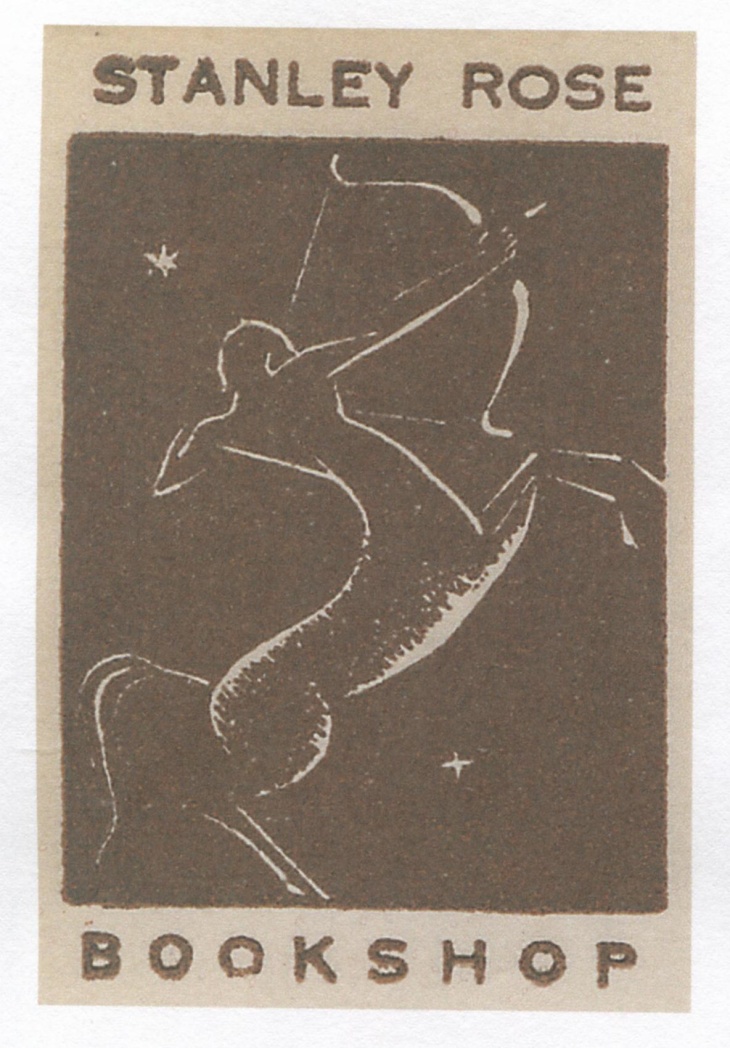

In the 1930s, the Stanley Rose Book Shop was a bohemian refuge and watering hole for writers who had come to Hollywood seeking more than a movie studio paycheck. The bookshop owner was Stanley Rose - a swaggering, large-hearted, hard-drinking Texan who was also a master humorist. An uneducated, some say illiterate, farm boy, he fought in France during WWI, and, after being wounded, was sent to a Veterans Hospital in Palo Alto, where he discovered a love for literature. A coin toss sent him down to Los Angeles, where Rose became a bookseller, going door to door peddling rare and Avant-garde books to movie studios. Soon, his first bookshop - the Satyr became known as a place you could buy rare, sometimes scandalous, books. Although he had only a fourth-grade education, Rose had an instinctive literary judgment and discerning taste.
The area became a playground for writers such as John Fante, Nathanael West, William Faulkner, Dorothy Parker, Dashiell Hammett, F. Scott Fitzgerald, A.I. Bezzerides, Jo Pagano, Horace McCoy, Jim Tully, John O'Hara and, of course, William Saroyan. "The bookshop and the bar operated together with superb synergy, creating a welcomed sense of community for screenwriters suffering from an understandable sense of displacement."
Rose would serve as an inspiration to many of the writers and artists he met: “Stanley was never rich in terms of material wealth. But his life was rich in legend and few men had more friends”. From his small mezzanine press above the shop, Rose printed small editions. “He encouraged young writers like the bombastic Saroyan, and his bookstore is thought to have inspired Raymond Chandler's famous bookshop scene in The Big Sleep.” Rose also nurtured L.A.'s modern artistic community, setting up a small, influential art gallery in the backroom. Here, he showed works by modern artists including Salvador Dali, Helen Lundeberg, Herman Cherry and Everett Gee Jackson. He held the first West Coast showings for Paul Klee, Alexander Calder, and Constantin Brancusi.

Unfortunately, Rose's discernment didn't extend to finances, and as the actor, William Blake described “generosity and easygoing approach to merchandising" finally put him out of business, and the Stanley Rose Book Shop closed. Rose tried to remake himself as a literary agent and claimed to have helped his old friend Saroyan sell the rights for The Human Comedy to MGM. This is what the LA Times reported:
“We asked what he had been up to since he lost his bookstore. Well, said Mr. Rose, with his $10,000 commission on the sale of the film rights to William Saroyan's "The Human Comedy" he bought a California melon farm, operated it throughout the war and eventually gave it up.
When we asked him how he would like to be running a bookstore again, a dreamy look touched with nostalgia, came over the man who erred in trusting writers and actors. "If I could only make another killing like that 'Human Comedy thing'...he said.”
Stanley's legendary bookshop was bringing luck to Saroyan too. In his book The places where I’ve done time, he remembers one particular day in 1932:
“One day in 1932, when I was twenty-four, I was loafing around in the bookshop talking with Stanley, and with friends of his who came to the store to load and browse.
John Fante came in and asked for a cigarette, but everybody was all out, so we went across the street and I bought us each a pack, and we lighted up, as the saying is. I had been asked by the photographer Peter Hancock to visit his studio, so he could take a few studio pictures – these are snapshots that are done without snappiness. I was about to go up to the photography studio when I noticed the door at the back of the tobacco shop. Two men came running into the shop, and the man behind the tobacco counter pressed a button that released the door latch, and the men went running into the back room. So I did, too, followed by John Fante.
The place was full of horseplayers and smoke and high tension and a mumble of grumbling voices. I looked up at the entries –Arlington Park in Chicago, I believe it was. And I saw the names of the horses in the next race. I considered them, and I considered the names of the jockeys, and John Fante said, “What are you going to do?”
“Make a bet,” I said. “I’ve only got three dollars and eighty cents to my name. I’ll bet the three, and if I lose I’ll hitchhike back to San Francisco tomorrow. If I win, I’ll stay a while.”
And the story goes as the following: Saroyan chooses the horses and makes the bet, and then they visit the photographer, who takes the photos. After they return…
"The instant I stepped into the betting room I knew each of the two horses had won. Everybody stepped aside, making a path for me to the payoff window. For three dollars I was paid just a few cents under $100.”
https://laist.com/2019/03/19/stanley_rose_bookstore_literary_las_hottest_spot_1930s.php
The places where I’ve done time, the Stanley Rose Bookshop, vine Street near Hollywood, 1932